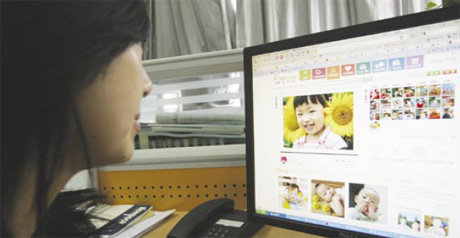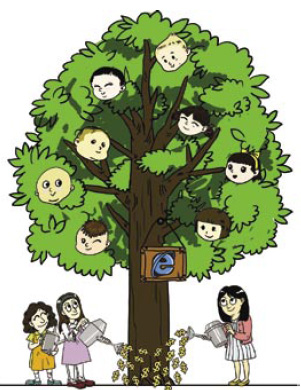 |
Large Medium Small |
|
 China's one-child generation often finds themselves at a loss for helpful parenting advice and peer support.Cui Meng/ China Daily
|
Lu Hao was panicking. For the last three days, her year-old son was bedridden with a fever even after being treated at a local hospital.
At the time, Lu's mother wasn't answering her calls. In a frenzy, Lu sought help from friends at Babytree.com, a community website that gives young parents advice and support.
She eventually contacted the mother of a 4-year old, who told Lu online that it is normal for a toddler to have a fever for three days. The mother told Lu that her son's immunity system would soon recover.
"If she hadn't told me this, I would have been so nervous that I might have given my son more medicine, and maybe some bad side effects," said the 30-year-old Lu.
She is among thousands from the one-child generation in China who often find themselves at a loss for helpful parenting advice and peer support. An average of 15 million people are born annually in China, which means that there are 100 million children under the age of 6 in a year.
The number of netizens is growing too - there are currently 400 million of them. Among that Web population, users between the age of 24 to 35 - the age at which most are thinking of raising a family - are quickly outnumbering other age groups.
"Most young parents have no sisters or brothers to consult with because of the one-child policy, and their parents don't have a great deal of parenting knowledge. Therefore, it is true that the existing support systems in China do not adequately meet a mother's needs so they visit websites for help and education, especially personalized online knowledge," said Gao Xiang, CEO of Yaolan.com, a platform for online parenting education and media in China.

There is no shortage of parental advice sites and blogs from mothers in the United States, but in China the field is sparse. This has led to a boom in websites for parents and children, including Yaolan.com and Babytree.com. China's two leading portal websites - sina.com and sohu.com - have launched parenting blogs. Taobao.com has set up a channel for baby and mothers in 2006, selling nearly 2 million children's products.
Babytree has 12 million visitors a month for peer-to-peer discussions about pregnancy, newborns and raising kids up to the age of 6. International advertisers, including Dumex, are major cash cows for Babytree.
"At present, advertisers spend 1 percent of their budget in online media including mobile phone and websites, but they will increase that to 30 to 40 percent in the next three to five years," said Wang Huainan, board chairman at Babytree. "This business is probably the biggest opportunity for online businesses today."
Matrix, a venture capital firm in Boston, invested $10 million in Babytree last year and now owns 40 percent of the company. Wang and his two partners evenly share the rest.
Babytree, started in 2007, has pulled in $3 million from more than 100 companies, half of them international.
Wang, a former marketing executive with Google China, said he modeled Babytree after BabyCenter, a slick US site that was acquired by Johnson & Johnson for $10 million in 2001.
Babytree, a Web network for friends who are parents, depends on peer-to-peer discussion.
"Moms are a special group that frequently look up peer recommendations," Wang said. "They buy pregnancy and baby-raising products not because the price is competitive, but because other mothers recommended them."
High consumption power among parents lures the advertisers to the social networks that give parental advice. Babytree logs information about each of the family's residence and the age of their child.
"If you know this, you know everything," Wang said. "This game is vertical and accurate investment. Other social networks are more like nightclubs where people come to have fun. Babytree is more of a community where parents come to stay. Plus, an 18-year-old woman and a 35-year-old mother have very different consumption power."
So far, 90 percent of Babytree's revenue comes from advertising and 10 percent from e-business.
Babytree also invests in online parent-education courses and partners with local baby services.
The advertisings from localized services are expected to reach half of the Babytree's revenue in one or two years, he said.
"In addition to advertisers, the website seeks more value from their relations with millions of mothers," Wang said. "Babytree is developing its own brand and products by working with education institutions to connect with our users."
E-commerce is the future of parenting-advice websites, Wang said.
"We have a strong online platform, the local small businesses know how to provide services. It is of the best interests to combine the two," he said.
Yaolan.com, a Chinese online education website for pregnant and nursing mothers, focuses on early education products.
Founded in 1999, the website, which received $17.1m from investors including Sutter Hill Ventures, Foundation Capital and NSA Investments in 2008, has about three million registered members. The company's business model includes advertising and personalized/multimedia parenting education system, contributing 85 percent and 15 percent to revenue, respectively. The education contents and system are developed by authoritative national parenting experts and is expected to play a bigger role in future revenue.
"Just because we did not invest in e-commerce does not mean it will not make money. But we consider education a better tool to give back to society," Gao said.
Its ABC program has seen more than a million users participating in the appraisal and reporting aspect, which is free, and 100,000 in the early education sections of the website that charges 360 yuan a year.
The company has invested 30-40 million yuan, a R&D team of 20 people and a marketing professionals on this project.
"Our website will gain profit from this year and more in the coming years," said Gao, who was previously the vice-president of Dangdang.com, a leading e-commerce company in China.
"The budgets of advertisers have a limit. But the education market is still in its infancy."
Yaolan's online early education products offer services to parents whose children are under aged 3 and children aged between 3 to 6. Unlike the underdeveloped online early education services, the market in China is promising.
"In the US, offline early education is available at an affordable price," said Gao, who studied at University of Wisconsin-Madison. "But in China, offline education services are often too high for ordinary people. But our prices are affordable."
China Daily